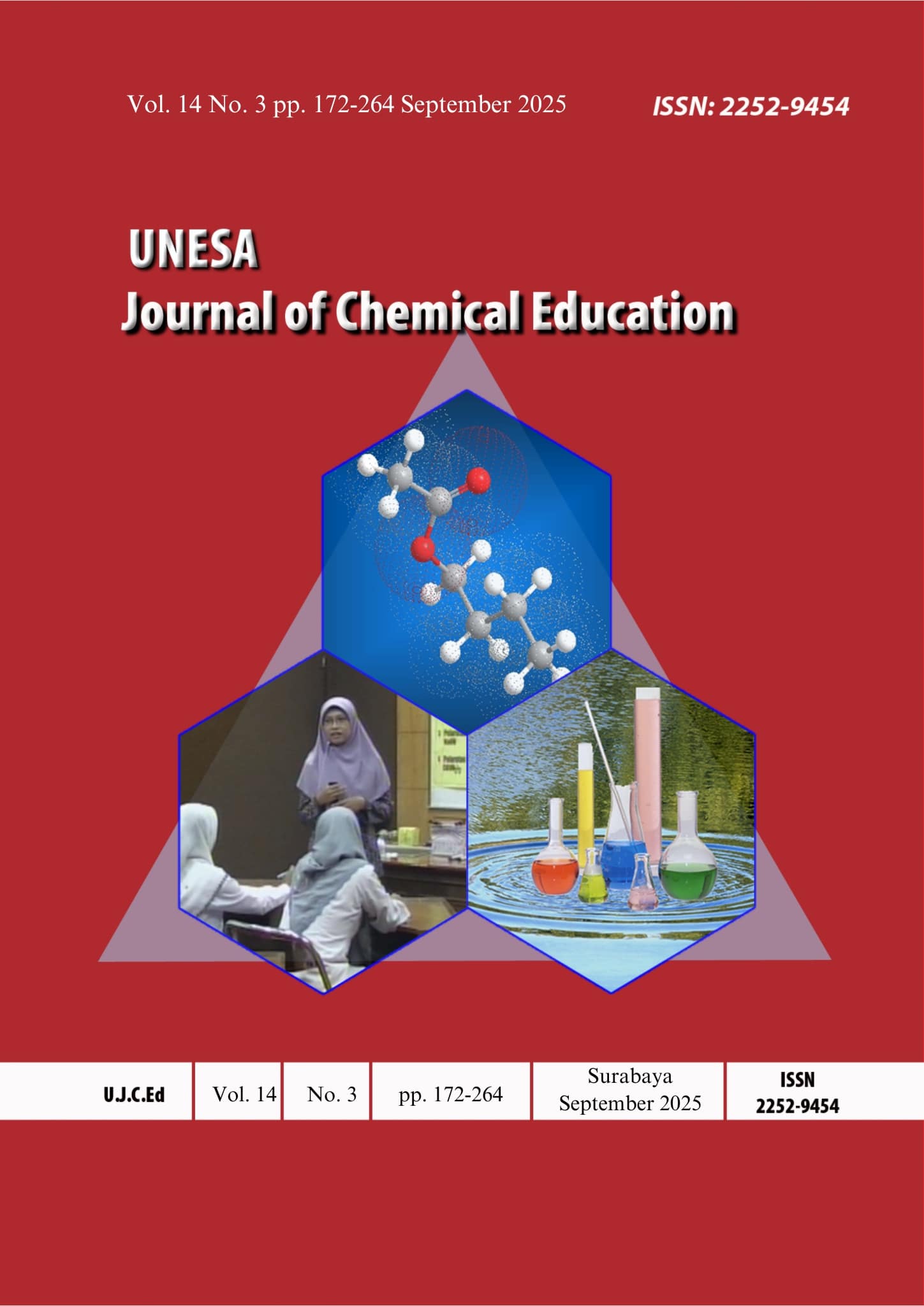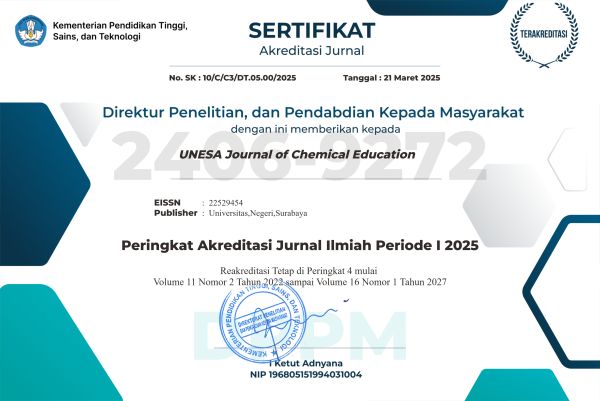THE USE OF GOOGLE SITES AS A LEARNING MEDIUM TO IMPROVE STUDENTS’ COGNITIVE LEARNING OUTCOMES AND SELF-EFFICACY IN THE TOPIC OF BASIC LAWS OF CHEMISTRY
DOI:
https://doi.org/10.26740/ujced.v14n3.p238-245Keywords:
google sites, class action research, cognitive learning outcomes, self-efficacyAbstract
This study aims to determine the improvement in students’ cognitive learning outcomes and self-efficacy through the use of Google Sites as a learning medium. The study was conducted at SMA Laboratorium UM in class X.4 in the 2024/2025 academic year with 36 students. The study was conducted using a Classroom Action Research (CAR) method. The instruments used were observation sheets, test questions, and self-efficacy questionnaires. The study results showed that the implementation of learning in cycle I was 88.28% and in cycle II was 90.50%. In addition, students’ cognitive learning outcomes increased, as evidenced by the students’ classical completeness rate, which rose from 44.44% in cycle I to 88.89% in cycle II. Students’ self-efficacy also increased from 24.50 to 30.14 in cycle II and was categorised as high. Thus, the use of Google Sites as a learning medium has been shown to improve students’ cognitive learning outcomes and self-efficacy in the context of the Basic Laws of Chemistry material.
Downloads
References
Ernest, I. Z., and M, M. D. P. 2023. The Use of Google Sites-based Electronic Modules in Science Learning Against Digital Literacy of Junior High School Students. JPI J. Pendidik. Indones., Vol. 12, No. 2, pp. 293–304.
Solikhin, F., and Wijanarko, A. 2021. The Development of Android-Based Learning Media (Chemdroid) on The Topic Thermochemistry to Improve The Students’ Achievement. JKPK J. Kim. dan Pendidik. Kim., Vol. 6, No. 2, pp. 138–52.
Bitu, Y. S., Setiawi, A. P., Bili, F. G., Iriyani, S. A., Elyakim, and Patty, N. S. 2024. Pembelajaran Interaktif: Meningkatkan Keterlibatan dan Pemahaman Siswa. J-KIP (Jurnal Keguruan dan Ilmu Pendidikan), Vol. 5, No. 2, pp. 193–198.
Unaida, R., Mellyzar, Fakhrah, and Sari, J. 2024. The Influence of the RADEC Learning Model (Read, Answer, Discussion, Explain and Create) on Student Self-Efficacy and Learning Outcomes. Proceedings of Malikussaleh International Conference on Education Social Humanities and Innovation (Miceshi), Vol. 1, No. 1, pp. 1–6.
Bandura, A. 2013. The Role of Self-Efficacy in Goal-Based Motivation. In: New Developments in Goal Setting and Task Performance. New York, NY, US: Routledge/Taylor & Francis Group.
Suprapto, S., Sudarmiani, S., and Nugraha, N. 2024. Influence of Self-Efficacy, Learning Interest, and Family Environment on Science Learning Outcomes. Int J Teach Learn., Vol. 2, No. 2, pp. 459–73.
Villafañe, S. M., Xu, X., and Raker, J. R. 2016. Self-efficacy and academic Performance in First-Semester Organic Chemistry: Testing a Model of Reciprocal Causation. Chem. Educ. Res. Pract., Vol. 17, No. 4, pp. 973–84.
Rahmawati, A., Anwar, L., Rasmiwetti, R., and Nursofia Y. 2024. Pengaruh Efikasi Diri dan Kemandirian Belajar Peserta Didik Terhadap Prestasi Belajar Kimia Kelas X SMA Negeri 15 Pekanbaru. Chempublish J., Vol. 28, No. 1, pp. 42–50.
Ramnarain, U., and Ramaila, S. 2018. The Relationship between Chemistry Self-Efficacy of South African First Year University Students and Their Academic Performance. Chem. Educ. Res. Pract., Vol. 19, No. 1, pp. 60–7.
Safdar, M., Batool, S. H., and Mahmood, K. 2020. Relationship between Self-Efficacy and Knowledge Sharing: Systematic Review. Glob. Knowl. Mem. Commun., Vol. 70, No. 3, pp. 254–271.
Aminah, N., Amami, S., Wahyuni, I., Rosita, C. D., and Maharani, A. 2021. Pemanfaatan Teknologi melalui Pelatihan Penggunaan Aplikasi Google Site bagi Guru MGMP Matematika SMP Kabupaten Cirebon. Bima Abdi J. Pengabdi. Masy., Vol. 1, No. 1, pp. 23–29.
Silitonga, T. U. W., Halida, H., and Aunurrahman, A. 2024. Pengaruh Model Flipped Classroom berbantuan Google sites Terhadap Hasil Belajar IPA Siswa Kelas V pada Materi Rantai Makanan. JPDI J. Pendidik. Dasar Indones., Vol. 9, No. 2, pp. 87–92.
Waryana, W. 2021. Penerapan Model Pembelajaran Flipped Classroom Berbantuan Google Sites untuk Meningkatkan Keaktifan dan Hasil Belajar IPS. EDUTECH J. Inov. Pendidik Berbantuan Teknol., Vol. 1, No. 3, pp. 259–267.
Pratiwi, N. A., Zamhari, M., and Ridzaniyanto P. 2025. Google Sites as a Tool for Chemistry: Exploring the 8E Learning Cycle Approach. IJCER Int. J. Chem. Educ. Res., Vol. 9, No. 1, pp. 61–73.
A’yuni, Q., and Ardhana, I. A. 2024. Pengembangan Media Pembelajaran Berbasis Website Google Sites Menggunakan Pendekatan Saintifik untuk Melatih Numerasi Siswa pada Materi Hukum Dasar Kimia. Chem. Educ. Rev. CER., Vol. 8, No. 2, pp. 54–62.
Lafendy, F. 2023. Urgensi Penelitian Tindakan Kelas dalam Lingkup Pendidikan. Tarbawi, Vol. 6, No. 2, pp. 142–150.
Apriani, I. 2023. Analisis Kesulitan Belajar Kimia Siswa Kelas X pada Materi Hukum Dasar Kimia di Sekolah Menengah Atas Negeri 1 Minas. Pekanbaru: UIN Suska Riau.
Arikunto, S. 2015. Dasar-Dasar Evaluasi Pendidikan. Jakarta: Bumi Aksara.
Schwarzer, R., and Jerusalem, M. 1995. Self-Efficacy Measurement: Generalized Self-Efficacy Scale (CSES). In: Measures in Health Psychology: A User’s Portfolio. Windsor: NFER-NELSON.
Maharani, N. F., Parlan, P., and Marfuah, S. 2021. Penerapan Strategi Pembelajaran Metakognitif PDCA Berbantuan Jurnal Belajar untuk Meningkatkan Self-Efficacy dan Prestasi Belajar Siswa dalam Materi Hidrokarbon. J. Pendidik. Teori Penelit. dan Pengemb., Vol. 6, No. 8, pp. 1306–1312.
Permana, H., Harahap, F., and Astuti, B. 2016. Hubungan antara Efikasi Diri dengan Kecemasan dalam Menghadapi Ujian pada Siswa Kelas IX di MTS Al Hikmah Brebes. Hisbah J. Bimbing Konseling dan Dakwah Islam, Vol. 13, No. 2, pp. 51–68.
Khan, S., Siraj, D., and Ilyas, Z. 2024. Effect of Lesson Planning on Academic Performance: Evidence from the Elementary Level Classroom. Pak. Soc. Sci. Rev., Vol. 8, No. 1, pp. 169–177.
Johdi, H., Gunawan, G., Ayub, S., and Kosim, K. 2024. The Effectiveness of Interactive Google Sites-Based Learning Media on Students’ Conceptual Understanding. Indones. J. STEM Educ., Vol. 6, No. 2, pp. 55–62.
Syah, R. F., Rusimamto, P. W., Sumbawati, M. S., and Rijanto, T. 2025. Efektivitas Media Pembelajaran Berbasis Google Sites Terhadap Hasil Belajar Siswa Pada Mata Pelajaran Instalasi Tenaga Listrik di SMKN 7 Surabaya.
A’yuni, A. K., Alfi, C., and Fatih, M. 2024. Pengembangan E-LKPD Berbasis Google Sites Materi Keragaman Kebudayaan untuk Meningkatkan Self Efficacy Siswa Kelas IV Sekolah Dasar.
Alafgani, M., and Purwandari, E. 2019. Self-Efficacy, Academic Motivation, Self-Regulated Learning and Academic Achievement. J. Psikol. Pendidik dan Konseling J. Kaji. Psikol. Pendidik. dan Bimbing. Konseling., Vol. 5, No. 2, pp. 104–111.
Meng, Q., and Zhang, Q. 2023. The Influence of Academic Self-Efficacy on University Students’ Academic Performance: The Mediating Effect of Academic Engagement. Sustainability, Vol. 15, No. 7, pp. 1–14.
Downloads
Published
Issue
Section
License
Copyright (c) 2025 UNESA Journal of Chemical Education

This work is licensed under a Creative Commons Attribution-NonCommercial 4.0 International License.
The license terms of the Creative Commons Attribution-NonCommercial 4.0 International (CC BY-NC 4.0) requires attribution to the original creator, permits non-commercial use, and does not allow for the application of legal or technological restrictions on others' use.
 Abstract views: 54
,
Abstract views: 54
, PDF Downloads: 29
PDF Downloads: 29













